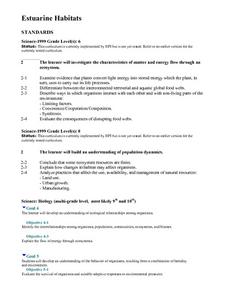Curated OER
Lesson 1
Students understand the meaning of natural resources. They distinguish between renewable and non-renewable natural resources. To help students identify natural resources as either non-renewable or renewable. To stimulate student thinking...
Curated OER
The Wilderness Concept: Our National Parks, History and Issues
Middle schoolers examine the history of the National parks. In groups, they discuss the concepts of conservation and preservation. They discuss the use of natural resources and how some are renewable and non-renewable. To end the lesson,...
Chicago Botanic Garden
Personal Choices and the Planet
The last activity in the series of four has individuals determine steps they can take to reduce their carbon footprints and then analyze their schools' recycling programs. Through a sustainability audit, they identify how and where their...
Chicago Botanic Garden
Personal Choices and the Planet
How big is your footprint? Activity three culminates the series by having groups complete carbon footprint audits with people in their schools and/or around the districts. Groups then gather their data, create a presentation including...
Curated OER
Estuarine Habitats
Sixth graders study the important habitats, flora, fauna, and physical factors of coastal habitats. They compare the aquatic habitats to terrestrial habitats by researching and completing tables with the information.




